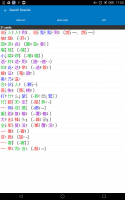@Peter - not sure why they're not coming up, actually; we'll investigate + hopefully patch that shortly.
@alex_hk90 - to be honest, the fixing was all done after we'd already converted the files to our own data format, so it would be difficult to back-port to something they could use, and in any event it was mostly fixing issues relevant to us and the particular requirements of our databases; ensuring that every entry had the same # of characters as Pinyin syllables, for example.
We submitted about 600 changes to CC-CEDICT at one point to based on our conversion work on that and they couldn't use them (and didn't really have a good reason to, since they weren't particularly important or interesting to anybody other than us), so now we simply maintain our own CC-CEDICT diff file and update it every time we do a new CC-CEDICT release. We don't anticipate regular updates to the MoEDict data, so we didn't bother building an automated process for applying our diffs to that, but if they did start actively developing it we could certainly turn what we have into something automated too.
@Abun - that one would be harder since we'd need to teach Pleco how to understand Minnan and Hakka romanization first; I assume a dictionary like this would be less-than-super-useful if it was only searchable by characters and not by pronunciation, correct?
@Taichi - we'll recheck those simplified mappings, thanks - to be honest our primary goal there was matching simplified versions in our other dictionaries when they also had an entry for the same word (so that you'd get nice clean merged results), so we didn't put as much time into making sure the simplified versions were correct in entries that were exclusive to MoEDict, but we certainly are going to go back and clean that up. In the meantime I'd suggest that you back up your flashcard database, then use the batch command to delete all of the simplified versions in your MoEDict-based cards (so only the traditional version is left) and remap again with those - should match up more nicely that way.
Bold headwords - yes, that's on our to-do list.
Playable 如's - we were planning to do that in our first release but they're a gigantic pain the butt to parse (formatting is inconsistent and sometimes downright wonky); hopefully in another update or two, though.
似: Our understanding was that synonyms/antonyms in the original file that aren't preceded by any numbers applied to the entire word, rather than a particular definition. Is that not the case?
勞動: that one may be on the coding end, actually - weird.
塞翁失馬: that one was a parsing issue, it looked to our system like a quotation. (they don't use 《》in those consistently, or do much of anything else to distinguish them from sentences that happen to be followed by full-width colons)


